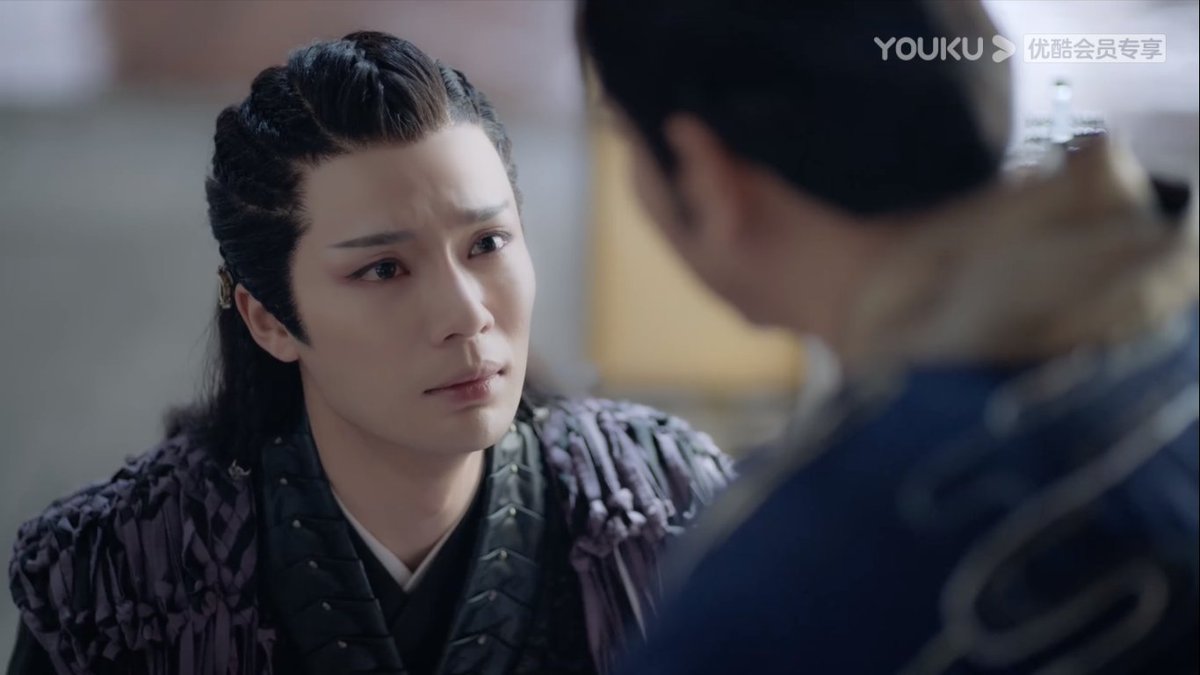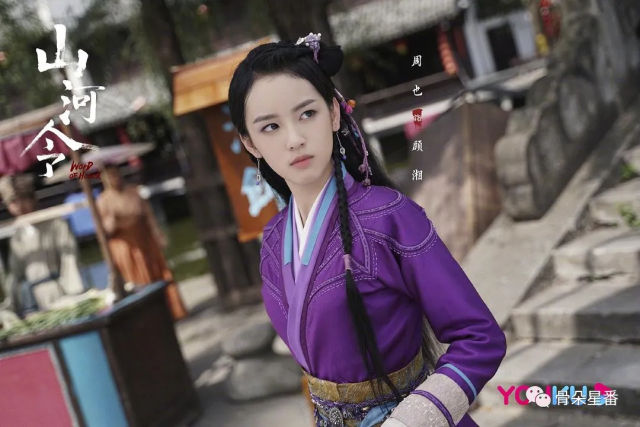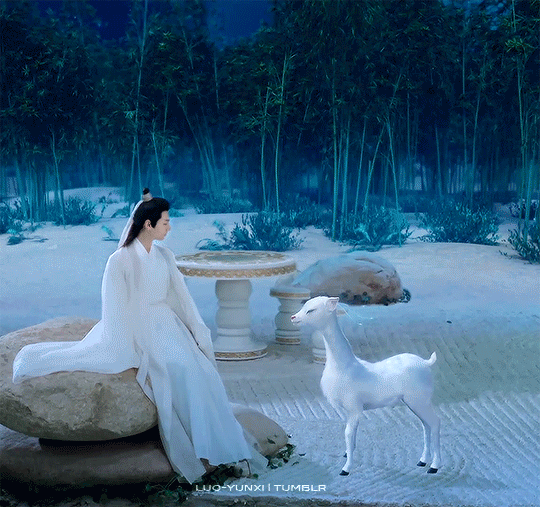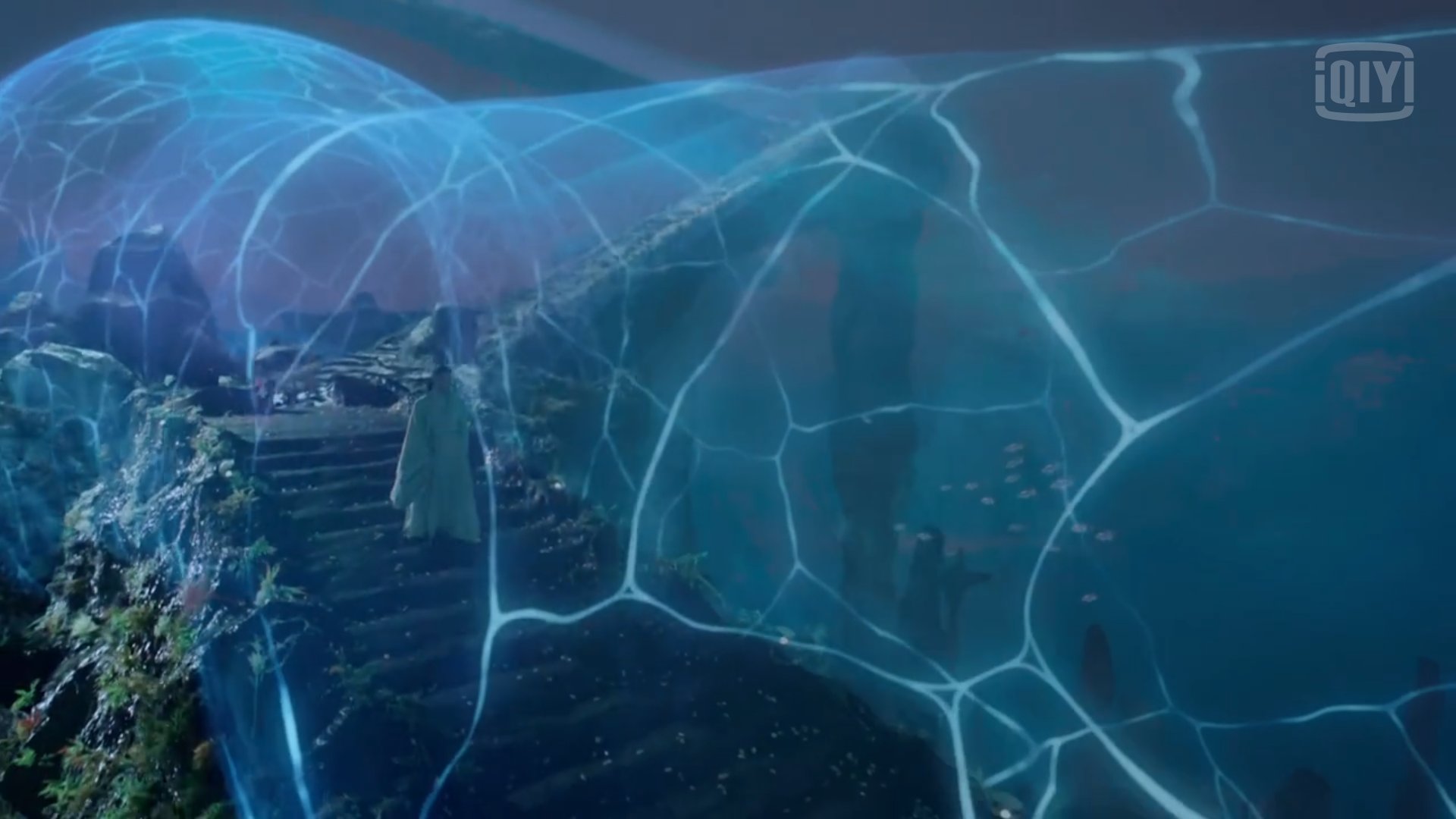Before I begin the review proper, I must admit that this was my surprise of 2021. As a danmei/wuxia fan, I am aware that this year is bringing a slew of new BL dramas set to air in the coming months and with the bts footage and rumours lighting up like wildfire last year, I was focused more on the production of Immortality/Hao Yi Xing and Winner is King/Sha Po Lang. I saw some bits and pieces of Shan He Ling (then given the English title of Faraway Wanderers) floating around and I did not pay it too much attention, and I believe many people in this community feel the same too. But oh goodness, was it a pleasant, pleasant surprise.
I shall split this review into sections and give each one a score as I normally, but I think I would also like to comment on a few more things (like how my expectations of the execution of BL dramas has skyrocketed which I can only hope the others coming this year can compare with), alongside other observations. This will be a long ride, but my focus will be on the adaptation aspect of the production, and how the changes between the novel and the drama have added to or subtracted from the viewer experience of the story.
THIS REVIEW CONTAINS SPOILERS FOR EPISODES 1-36 (AND THE BONUS MV).

Looking at the promotional poster itself, it is easy to gauge the genre. This is pure wuxia (think Condor Heroes rather than Ashes of Love) set in the jianghu, and 36 episodes were announced after quite a few hiccups experienced by the production during the pandemic last year. Expectations were kind of there and not extremely high, and most danmei fan watchers were treating it as a sort of segue into the big names airing later in the air.
A Daring Dance: Novel to Drama (Changes, Censorship and Clever Management)
Based on Priest’s web danmei (BL) novel Tian Ya Ke, Word of Honor follows the story of Zhou Zishu (played by Zhang Zhehan), a former leader and member of a secret assassin order working for royalty, who decides to leave and chances upon Wen Kexing (played by Gong Jun), who seems to be flirtatious on the surface but is also hiding a secret. Though they get along quickly, things do not seem to be very happy for the couple since Zhou Zishu does not have long to live due to the seven nails he has embedded in his body prior to leaving his assassin guild. He has around two years left before he dies, and Wen Kexing remains unaware of this for a while. They are the novel’s main couple, and along the way, they become embroiled in a layered political plot involving sects, a powerful object and the last surviving teenage son of a wiped out clan.
The plot of the novel and that of the drama changes here and there, some to pass censorship demands while others are there to heighten the dramatic potential of the story and the character relationships but all in all, most fans of the original novel were satisfied with most of the scriptwriter’s creative decisions.
I think this is the first BL drama I am doing a full review of on my blog, so to those who are new, I shall write briefly about China’s take on this genre. BL/danmei has been around for several years now and is hugely popular thanks to previous successes of dramas such as Guardian and The Untamed, both of which are adapted from danmei novels. There is no way that a blatant romantic story between two men can be shown on Chinese television, so scriptwriters, actors and directors find different ways of portraying these relationships that are acceptable by the censorship board, and palatable to the danmei audience. Most of the changes in Word of Honor seems to be stemming from this concern, and to be fair, it is very understandable. There have been other drama adaptations of BL novels where the BL element was completely removed (for instance, Birth of the Drama King), but with Word of Honor, this was not the case.
In fact, when it first aired and people were sharing screenshots all over the internet, so many of them expressed concern over certain scenes and moments being truly testing the waters of censorship, and were worried if the drama could air to completion in case something happens along the way. It is a legitimate fear, given that Guardian had been pulled from Youku some months after the last episode aired due to “vulgar content” before be re-added with re-edited and deleted scenes. However, the scriptwriter, the actors and the director found an extremely clever way to deal with this potential problem.
The genre itself.

So, of course, Word of Honor is a wuxia drama, which means that the director, cinematographer, actors and costume designer went their way to maximise their employment of tropes as far as they could to portray the relationship between Wen Kexing and Zhou Zishu (and keeping the novel fans and BL fans happy in the process, and staying true to the source narrative), while also scraping past their more conservative audiences. Either way, it is a win-win situation for Youku (Wor of Honor‘s broadcaster).

Beyond the employment of the wuxia genre’s visual language, Word of Honor also makes very clever use of classical Chinese poetry, through Wen Kexing, so in short, he gets to flirt openly on screen but it all gets kept in because (1) it is in character for Wen Kexing, who is presenting himself as an educated nobleman, and (2) it is poetry and seeing this is wuxia, references to classical poetry were expected of the genre. For a better explanation of this, allow me to direct you to AvenueX’s fantastic video covering all of Wen Kexing’s poetry from episodes 1-14 here.
Finally, Word of Honor found itself relying on the save-it-all trope of having the two male leads be shixiong and shidi, belonging to the same sect, Four Seasons Manor, which allows for a lot of ‘skinship’ to go under the radar because of the implied closeness of their relationship since they were children. Hence, moments like this gem happened:

So all in all, the cleverness and dedication of the scriptwriter, director, costume designers, and the actors have all led to this production that makes people question and wonder, while also wholeheartedly enjoy.
The one perhaps not very pleasant thing about the team snaking around censorship would be the events leading to the ending. (WARNING: SPOILERS FOR BOTH TIAN YA KE AND SHAN HE LING AHEAD)
In Tian Ya Ke, the events of the plot happen, Zhou Zishu gets healed and then he, together with Wen Kexing and Zhang Chengling (the child I mentioned earlier) in Four Seasons Manor and they live happily ever after.
In Shan He Ling, it is different. Zhou Zishu does not get himself healed as he does in the novel because of a set of events that happens prior. As much as he wants to continue living, and things seem to be going quite all right, everything takes a turn for the worse when Wen Kexing fakes his death without keeping Zhou Zishu aware of it. Hence, now that his reason for living is gone, Zhou Zishu extracts all the seven nails at once to maximise his martial prowess so that he can avenge Wen Kexing’s ‘death’ before his own. But of course, in true Romeo and Juliet fashion, Wen Kexing is alive but now, Zhou Zishu has hastened his own death. This is tragic enough, but later on, right at the end of the final episode, Wen Kexing turns around and tricks Zhou Zishu into performing a special type of ‘dual’ cultivation with him that would extend his lifespan. What Zhou Zishu does not know is, that Wen Kexing is giving him all of his life essence and will hence, die in the process.

Here is where the complexity comes in. Before going further into this, some viewers are not very fond of the events that led to this in-episode tragic ending. One, netizens have pointed out that the sad ending seems to be forced in a way – Zhou Zishu had to be unaware of Wen Kexing’s fake death plan so that he can be in enough distress to extract the nails and hasten his death even though it did not make complete sense for it to be so. Character wise, that decision was definitely what Zhou Zishu would do, but the events leading to it did not fully sit in with many viewers. It seems that everyone, including Chengling, Jing Beiyuan and Da Wu (the two people who were supposed to help Zhou Zishu recover), and various others all knew of his plan EXCEPT Zhou Zishu. There was no reason at all for this, since there is no risk of Zhou Zishu exposing anything in the first place since, well, he is an ex-assassin and the closest person to Wen Kexing. But of course, given the production’s budget and how it was initially supposed to be 45 episodes long but forced to shrink to 36, there is a need to speed up the plot trajectory so that the finale can be reached.
Furthermore, the screenwriter did promise a HE (happy ending) so, viewers were naturally shocked to see the actual outcome. But guess what? All of this is to secure Word of Honor in its place without risking losing it to the chains of censorship, once more. The ending in episode 36 can be read as BE (bad ending) where Wen Kexing dies and Zhou Zishu is left alive. Naturally, though he may not wish to live anymore, he would also be gripped by the guilt that he is living on borrowed time from Wen Kexing and hence, it is extremely likely that he will live on without being drawn towards suicide, so he will sad and lonely for the rest of his natural lifespan. This ending has passed the censorship check and Word of Honor is free to air without trouble. They also did not leave it open, at least from Wen Kexing’s perspective: he is giving up his life as far as he is concerned so that Zhou Zishu can live on.
“Money LITERALLY buys happiness.” Youku, 2021.
However, Youku is clever not only in disguising male-male romance under the folds of the wuxia genre and classical Chinese poetry, but also in grabbing coins from desperate viewers. Those with access to Youku’s app were able to purchase a 7 minute long MV special for 3 yuan – expertly disguised as a nostalgic MV with scenes from older episodes playing over the ending title song, and the last four minutes is an added scene.
This is the HE (happy ending), which was filmed along with the BE. In this, we cut and we see Zhou Zishu in the snowy mountain, probably at least a decade or two after the ending of episode 36, and then appears Wen Kexing – blue-robed and white haired. Though it seems to be leaning towards Zhou Zishu’s hallucination, the fact that the two people standing below the cliff point out and remark that “when immortals fight, no one knows when it is going to end. These two have been fighting for their whole lives.”
So, just like the BE at the end of the episode seems to be very very clearly a BE from Wen Kexing’s point-of-view, the HE in this special is very very clearly a HE because the two lovers are alive and immortal, and living together in the mountain.

Highly perceptive viewers have also observed the parallels in the fight choreography in this scene, and another pivotal scene from episode 6 (where Wen Kexing attempts to remove Zhou Zishu’s disguise), which you can view in this tumblr post here.
All in all, most viewers were satisfied, and the drama continues to air on Youtube, and is set to begin on Amazon Prime in the coming months.
SOME OTHER THOUGHTS…
So, as indicated before, Word of Honor has truly surprised me on all ends – I honestly only went into it with the intention of watching a good wuxia BL drama as I wait for others like Immortality and Winner is King to air later in the year. I did not expect to be so pulled in and transfixed by the story, the characters, the incredibly clever use and melding of genre and literary conventions to stay as true to the essence of the original story as far as they could. Adaptation wise, I would say this one is quite a fair one, though of course, there are some bits that may have been better executed.
Acting wise, I loved Zhang Zhehan’s flair for the “harsh yet gentle” nature of Zhou Zishu, and I think he performed very well in his moments of complex emotional turmoil – he laugh-cries very convincingly to wrench your heart as you watch. Gong Jun delivers best when he is performing his scenes with Zhang Zhehan, and you can see his improvement in certain scenes from others (remember, tv shows are not always shot in chronological order). I particularly loved his lighthearted flirtatious moments with Zhou Zishu, and in that crucial scene in the rain where he laments the impending death of Zhou Zishu and how he is too late. Other actors I was impressed by were Zhou Ye, who played Gu Xiang – who transitioned from playful young teenage girl to pining lover with conflicted emotions, to vengeful widow in episode 35; Li Daikun, who plays the Scorpion King, managed to fool me enough for too many episodes with his doe eyes and sad expression and his wonderful way with words. When I heard that he was initially supposed to play Wen Kexing but decided not to because he felt he could not carry the role well and chose to play the Scorpion King, I gained new respect for him as an actor.


ENDING THOUGHTS…
All in all, Word of Honor has been the dark horse that reared its lovely head, much to the delight of c-drama fans, although there are some criticisms that cannot be overlooked. A way to express how I feel about it as a whole is that to me, it felt like a performance on its own. Watching Word of Honor was like watching a dance, akin to its lovingly choreographed fight/dance scenes between Wen Kexing and Zhou Zishu – a dance for the eyes and the minds of viewers, surprising with its daring steps, and a further more daring dance around the quest to stay as true as possible to the spirit of the original text.
Special mention of course, to the absolute gem of a production crew that Word of Honor had the good fortune of falling in the hands of, who had to bear the brunt of the pandemic in 2020 halting production midway, leading to budget cuts and delays to the point that the original actors chosen for the main roles could no longer commit due to scheduling conflicts. But they pressed on and continued doing what they intended to do, with budget deficit and increasing pressure all pushing against them, especially given that they would probably have been aware of the other BL dramas that were shooting around the time with greater budgets and less disruptions. They have my respect, and they deserve all the fame and recognition, and I think I personally feel that their determination to bring to us the soul of the drama they had in mind in spite of all the hurdles is reminiscent of classic wuxia dramas – where the hero trudges through all faces of adversity and emerges triumphant.
Last but not least, all of us owe our greatest thanks to Wolong Daily Nuts for sponsoring the production, leading to perhaps some of the most fascinating product placements I’ve seen in a show. At first, I thought it was silly and it glossed over my mind and then I started seeing posts around on social media about how much of an impact Wolong’s sponsorship actually had on the show – without them, we probably would have gotten far, far less than what we love, if any at all.

Definitely quite high on my list, and I wonder how the upcoming BL dramas will hold up, and I am always impressed with how much they have surpassed my expectations in spite of the troubles they had to face. I hope to see more from them, both cast and crew, in the near future.
Final verdict: 4.6/5








